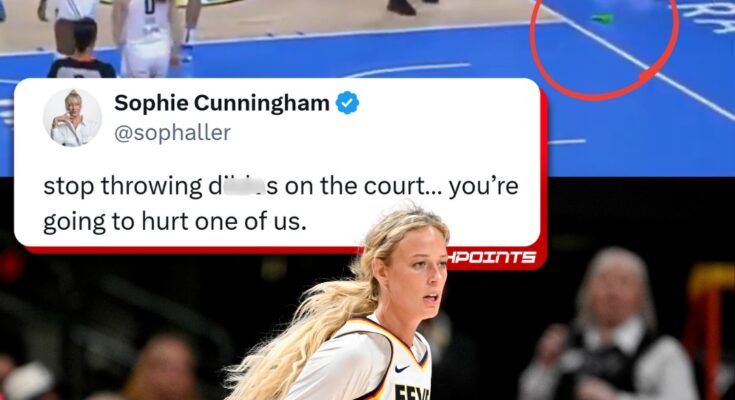Sophie Cunningham Raises Alarm Over WNBA Player Safety as Vulgar Fan Incidents Escalate
The landscape of women’s basketball is electrifying and transformative. Yet, amidst thrilling dunks, passionate rivalries, and packed arenas, a more troubling storyline is emerging. Sophie Cunningham, Phoenix Mercury guard and beloved WNBA personality, is stepping firmly into the spotlight—not only for her play, but to sound the alarm over escalating safety concerns for players, particularly after an unsettling trend made headlines this week.
For the second time in a matter of days, a highly inappropriate object—a dildo—was hurled onto the court during a WNBA game. These incidents, more than a mere breach of etiquette, have thrust player safety and league responsibility into the national conversation. Cunningham’s candid response is more than just frustration; it’s a rallying cry for change and a call to action against harassment that’s too often normalized or minimized when it comes to women athletes.
When Celebration Crosses the Line
The WNBA is riding a surge of popularity. Record-breaking crowds, mainstream media coverage, and household names—Caitlin Clark, A’ja Wilson, Breanna Stewart—sport rarely seen in its history. But with virality comes volatility, and not all attention has been positive. While professional athletes expect and even thrive on intense environments, there’s a point where raucous energy becomes a real—and potentially traumatizing—hazard.
“These incidents are not just disrespectful, they’re dangerous,” Cunningham explained after the second dildo incident this week. “We need to feel safe where we work. No one should have to dodge flying objects, let alone ones meant to humiliate us or make a spectacle.”

The Dildo Tosses: What Happened?
There’s shock value, and then there’s outright targeted harassment. Throwing anything on a court or field is universally regarded as a major violation at sporting events. But when fans began tossing sex toys onto the parquet during games, the act took on a particular, disturbing undertone—one uniquely gendered and loaded with intent to degrade.
The first incident made headlines and drew widespread condemnation. The league and arena staff responded by ejecting the perpetrator and increasing security presence. Yet, less than a week later, it happened again—suggesting emboldened, rather than chastened, troublemakers.
“These aren’t isolated pranks or harmless fun,” said Cunningham. “It’s about crossing a line and seeing what you can get away with, at players’ expense.”
Not Just a WNBA Problem
Experts point out that unruly fan behavior is certainly not unique to women’s sports, but there’s a paradox when it happens during WNBA action. Many female athletes have spoken, sometimes quietly, more often anonymously, about the unique harassment they face—from lewd heckling to online abuse to, now, sexually explicit objects appearing in what should be a safe workplace.
Basketball historian and commentator Lindsay Gibbs noted, “It’s not just the object thrown, but the underlying message: a reminder of the toxic behaviors that women, and especially women in male-dominated environments, are forced to navigate.” When the object is sexual in nature, it can make an already intimidating experience borderline traumatic, adding an extra layer of anxiety to what is supposed to be a professional setting.
Sophie Cunningham Speaks Out—and Inspires a Chorus
Cunningham, never one to hold back when the moment calls for strength, didn’t mince words. “Security has to be decisive. The league needs to protect us,” she asserted. “We love the fans. We love the noise, the energy. But there’s a limit.”
It wasn’t just Cunningham ringing the alarm bells. Teammate Diana Taurasi weighed in after the game, calling on owners and league officials to “take every report seriously and make sure this doesn’t become normalized.” Aces star A’ja Wilson tweeted her support for Cunningham, agreeing that swift, public action is “non-negotiable.”
The WNBPA, the players’ union, added its voice: “No one comes to work expecting to be a target for abuse. We are proud of Sophie and all athletes speaking out, and expect arenas and the league to have our backs—visibly and immediately.”
The League’s Response
The WNBA released a statement condemning the incident and announced that it is “reviewing current security procedures, holding discussions with arena management, and considering further disciplinary action for future breaches.” Several venues reportedly began requiring bag checks and stepped-up camera monitoring for upcoming games.
Still, some players and fans worry that more needs to be done, and quick. “If people think they can get away with this, others will try it,” said Cunningham. “The next step is someone getting hurt, or a situation escalating. We want to keep our games electric, but safe.”
Why This Moment Matters
Why has the dildo-throwing saga—and Sophie Cunningham’s reaction—struck such a chord? The answer lies in what it represents, beyond a few disruptive moments. At its core, this is a battle for respect, equality, and the right to compete free from uniquely gendered threats and humiliation.
Increased visibility for the WNBA means more eyes, more passions, and sadly, more bad actors. As the league pushes toward a new era—one that’s professionally lucrative and nationally relevant—player safety must rise to the same level as on-court excellence.
“We’re asking for what every worker deserves,” Cunningham emphasized in a later interview. “Dignity. Basic security. To play the game at the highest level—and know you can worry about your opponents, not about what’s coming at you from the stands.”
Moving the Game—and the Conversation—Forward
The hope is that these incidents serve as a wake-up call, not a harbinger of a new, dangerous trend. Already, Cunningham’s outspokenness has sparked public debate, with fans, commentators, and even rival teams joining the conversation. Supporters are urging league partners, city officials, and event security to unite in keeping the game “fun, loud, and fearless,” but never unsafe.
Ultimately, the conversation Cunningham has sparked may prove transformational—not just for the WNBA, but for all women in public arenas. For every crude jeer, every object hurled, the pushback grows—a testament to the league’s rising power and the strength of those who play not just for the scoreboard, but for progress itself.
Cunningham summarized it best: “If speaking out today makes things safer for someone tomorrow? That’s a win I’ll always fight for.”


